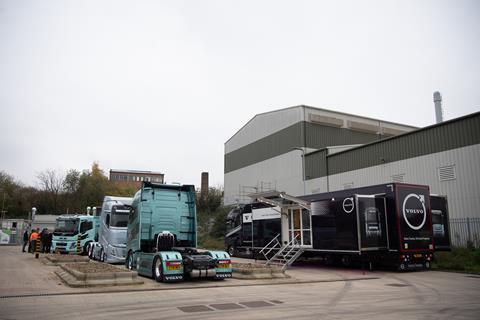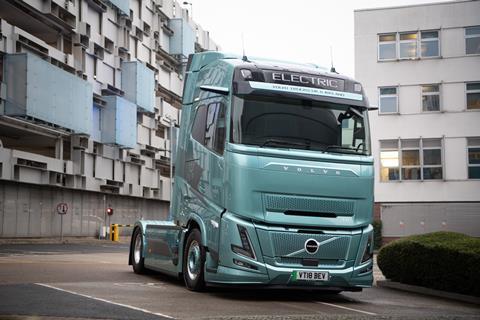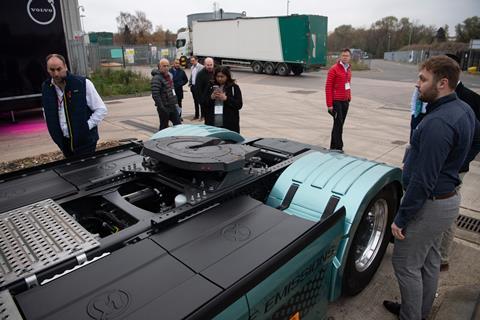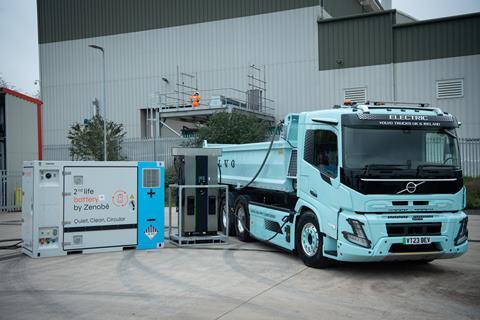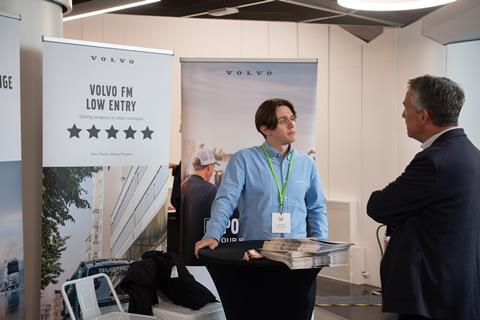Last week, Volvo Trucks presented a comprehensive update on its decarbonisation strategy at the Motor Transport Decarbonisation Summit, outlining key advancements and strategic directions for achieving zero emissions road transport.
The presentation highlighted Volvo’s multi-path approach involving battery electric, fuel cell electric, and internal combustion technologies, focusing on both current solutions and future innovations for long-haul and heavy-duty vehicles.
Battery electric technology in action
Anthony Cunningham, E-Mobility Sales Development Manager at Volvo Trucks, emphasised Volvo’s commitment to battery electric vehicles (BEVs) as a cornerstone for decarbonisation. Volvo now offers electric models across a broad weight range, from 16.7-tonne trucks to 44-tonne heavy-duty tractors, aiming to make the transition from diesel straightforward for fleet operators. Cunningham noted Volvo’s range of electric vehicles can cater to varied operational needs, including its Volvo FM Low Entry electric truck suited for urban waste collection, construction work or goods deliveries that require excellent direct vision. Additionally, the company has developed a Route Simulator, a tool enabling operators to assess whether electric models are viable for specific routes based on factors like payload, terrain, and daily mileage.
However, Cunningham acknowledged operators’ concerns over range and charging infrastructure, stressing Volvo’s tailored approach to help customers transition seamlessly by consulting on truck configuration, route planning, and payload requirements. To further support the shift, Volvo is also offering financing for charging infrastructure as part of its package, with options for depot charging and on-the-go solutions.

Charging solutions and infrastructure challenges
Joe Ellwood, Electric Truck Charging Manager at Volvo Trucks UK, expanded on the charging options available for different models, with medium-duty trucks typically charging overnight via AC wall boxes, while heavy-duty models benefit from faster DC charging. He underscored the complexity and cost of establishing high-capacity DC charging at depots, especially for large fleets. Volvo has addressed this through its “Milence” partnership with Daimler and Traton, which aims to create a network of shared charging hubs across the UK and Europe to support heavy vehicle operations.
With the grid upgrade process often lengthy, Ellwood recommended early planning for infrastructure deployment. He noted that fleet operators may consider alternative solutions, such as on-site renewable energy or battery storage, to supplement grid capacity. Volvo is also exploring “charging as a service” models, where operators pay per kilowatt-hour to avoid upfront infrastructure costs.

Future role of hydrogen and long-haul applications
Volvo’s multi-faceted approach includes plans for hydrogen fuel cell electric vehicles, intended primarily for longer-haul applications where battery electric might fall short. Cunningham outlined the expected timeline, with road trials for hydrogen fuel cell vehicles set to begin in 2026, aiming for a commercial launch by 2030. Volvo views hydrogen fuel cells as essential for markets with extensive long-haul needs, particularly in areas with limited electric charging infrastructure. However, hydrogen combustion engines, though explored, do not meet current zero-emissions standards and are therefore not being pursued in the UK at this time.
For ultra-heavy applications (250 tonnes and above), Volvo believes internal combustion engines (ICEs) powered by alternative fuels like renewable LNG will remain viable. Although electric options continue to advance, Cunningham noted that the current battery technology is not sufficient for these ultra-heavy loads, leading Volvo to retain a mixed technology portfolio.
Industry collaboration for decarbonisation
Volvo’s representatives highlighted the importance of collaborative efforts in the industry to make a zero emissions future viable. The Milence partnership and Volvo’s involvement in research and industry discussions underscore the need for collective action to overcome the significant infrastructure and technology challenges ahead. Volvo stressed that while multiple technology paths are being pursued, each solution is tailored to specific operational needs, avoiding a one-size-fits-all approach.
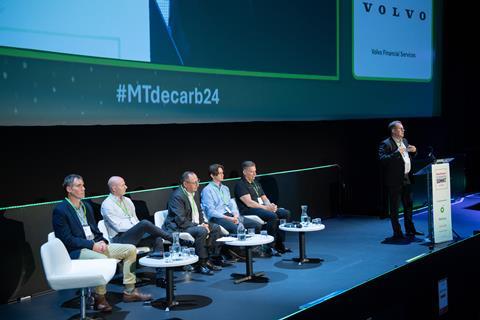
A path forward for road transport operators
Volvo’s presentation at the summit reflected a commitment to a tailored, consultative approach to meet the diverse requirements of today’s road transport operators. The company’s readiness to work closely with clients—whether through vehicle selection, route simulation, or infrastructure planning—emphasises Volvo’s strategic focus on ensuring a practical, phased transition for fleets of all sizes and needs.
FCZ found it refreshing to see that Volvo is committed to providing the “right truck at the right time”, prioritising customer needs over a quick sale, as Cunningham explained: ”There are many times when customers come to us eager for an electric truck. But after running route simulations and having in-depth discussions, we sometimes have to say, ‘Right now, this isn’t a viable option.’”
He explained that while electric might work for them in the future, Volvo’s priority is to provide the right truck for the right job. ”We’d rather pass on a sale today than risk selling a solution that doesn’t meet their needs, knowing that doing the right thing now builds trust for the long term,” he added.
At the same time, Volvo also revealed that it is looking to play its part to help create a mature network of charging infrastructure in the UK. Umar Sharif, Electromobility Support Manager at Volvo elaborated: “We have quite a few charge points already in Ireland at our sites and in the UK, we are slowly rolling out infrastructure into our depots, so that will become another option for customers. They can swing in, do a quick charge and carry on if the location is strategic enough for their trucking routes.”
FCZ’s view: By combining financing models, an expanding charging network, and a technology-diverse vehicle lineup, Volvo is clearly positioning itself as a leader in the decarbonisation of heavy transport and looking to meet operators’ needs now and in the long term. As battery and hydrogen fuel technologies advance, it will be interesting to see if Volvo continues with its multi-technology approach or aligns itself to one specific fuel type.










